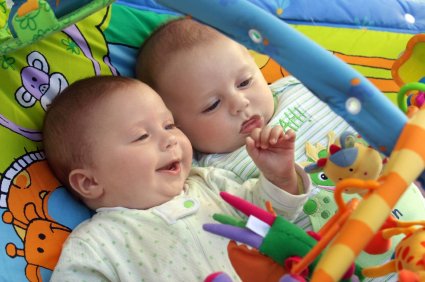 The importance of play for babies’ development has been well documented. Parents want to do what’s best for their babies and try to select activities that will encourage development. This can be confusing. Two common questions asked by parents: How much time should I spend playing with my baby and what should we play?
The importance of play for babies’ development has been well documented. Parents want to do what’s best for their babies and try to select activities that will encourage development. This can be confusing. Two common questions asked by parents: How much time should I spend playing with my baby and what should we play?
Parents often wonder how they should play with the baby. In the beginning, play will involve interacting with the baby. Talking and cooing to the baby are natural and a great way to interact socially with your baby. At first, you will be doing all the “talking”. Your baby will reward you with a smile and will begin to make vocal sounds back to you at around three months of age.
The need for play time increases as the baby gets older. In the first month, babies spend most of their time sleeping and eating. They are focused on your face when awake and during feedings. After the first month, baby is starting to stay awake for longer periods of time. As the baby spends more time awake, she will naturally become interested in everything around her. By the time the baby is three months, she will be interested in colorful toys made for infants.
It’s important that you engage with the baby and respond to his vocalizations. This game becomes like a conversation. Between the ages of three and four months, this becomes a fun game to play. My son will squeal and coo louder and louder every time I repeat the sounds back to him. He is making eye contact and learning the basics of human communication in this simple and fun game.
If you want to start playing more often with your [tag-cat]baby[/tag-cat], find a quiet time to introduce toys or activities. Don’t try to play when the baby is tired or at a time of day when the baby routinely gets a bit fussy. For many babies, this happens in the evening around dinner time. This time of day is known as the witching hour for a reason. Instead, pick a time when your baby tends to be the happiest. She should be rested and fed prior to play time.
Follow your baby’s lead in activities. If he decides he wants to take the book away from you, stop reading and play with the book. Point out pictures and name the objects for the baby. Your baby will probably be interested in the toys on his [tag-ice]play gym[/tag-ice] or bouncy chair first. He can lie on his back and swat at the [tag-tec]toys[/tag-tec]. As his small motor skills increase, he will be able to grasp a rattle or other small toy.
Babies will lose interest in a game or play activity fairly quickly around this age. A few minutes are often enough time for a younger baby. Watch your baby’s signals to determine when she has had enough play time. Your baby will give you cues, such as looking away, rubbing her eyes or fussing. Try a few, very short play sessions in the early months.
As your baby gets bigger, he will want to play for longer periods of time. Sometime around four months old, the baby begins to actively seek your attention and focuses more on you and objects around her. He will spend more time focusing on the objects he has grasped in the chubby palm of his hand. This exploration will continue as baby learns to sit up and finally to move around the room, exploring his environment.
Provide opportunities for exploration when you are playing with your baby. When choosing play things for your baby, remember that they tend to put everything in their mouths. Be sure the toys you choose are safe and contain no small pieces that could pose a choking hazard. Babies love to explore regular household items as well. Give the baby a few plastic cups and spoons to play with. Let her bang the cups with spoons or manipulate the objects in any way she chooses.
As your baby grows, play time will gradually increase. Your baby is learning a lot and is better able to manipulate toys. Continue to follow your baby’s cues during your play sessions. When he is getting tired, bored or cranky, he may need a break. Remember to keep play time low key and fun.
Biography
Patricia Hughes is a featured writer at More4kids. She is a freelance writer and mother of four. Patricia has a Bachelor’s Degree in Elementary Education from Florida Atlantic University. She has written extensively on pregnancy, childbirth, parenting and breastfeeding. In addition, she has written about home décor and travel.
No part of this article may be copied or reproduced in any form without the express permission of More4Kids Inc © 2007










Add Comment